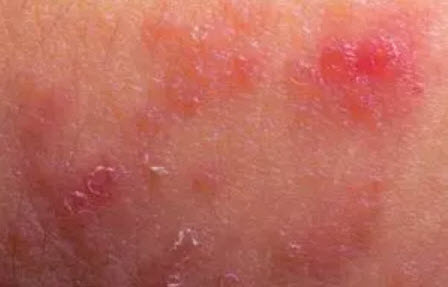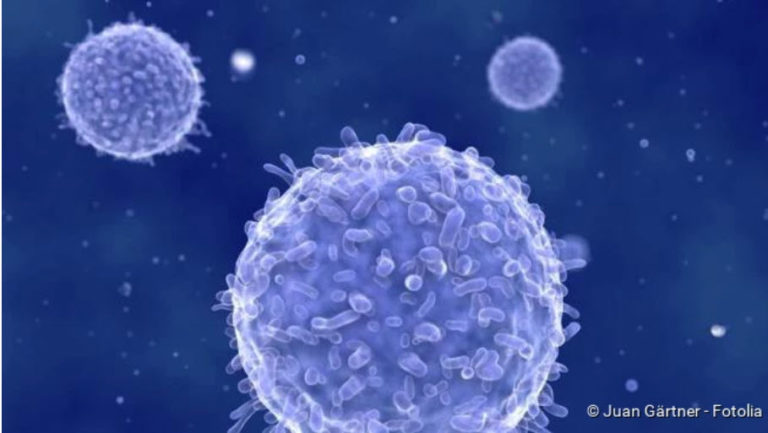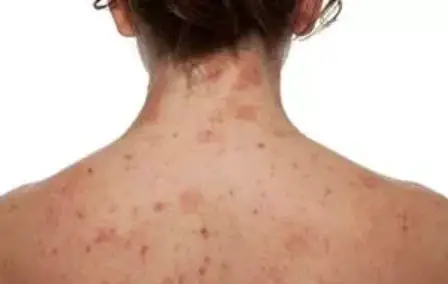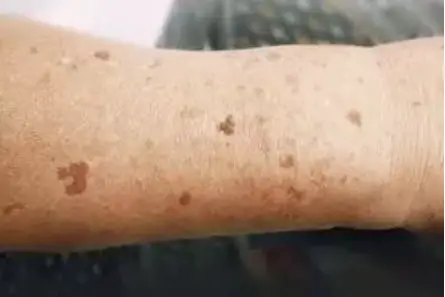Care for dry facial skin
Care for dry facial skin

The skin of the face is one of the most important parts of the body. A dry face can be rough and tense, but also show redness, flaking and itching. There are several causes for dry skin on the face. If these are known, it will make it easier to find suitable recommendations. A dry face becomes rough and sometimes flaky.
Indications
Dry face and the relationship with skin types
A dry face is a common skin condition, yet some people tend to have more dry skin than others. The main skin types for the face are normal, dry, oily or combination skin. With increasing age, the effects of skin aging on the skin also come to the fore.
- Normal facial skin is skin that is neither too dry nor too oily. With normal skin, numerous factors can influence the skin to become dry (see also the following section “Causes of dry facial skin”)
- Dry facial skin not only tends to dryness, but it is also tight and is noticeably rough in some areas.
- Oily facial skin usually does not become dry, only if it is washed too often or if the daily skin care needs to be improved.
- Combination skin on the face tends to dryness in certain areas of the face, especially on the cheeks. The T-zone, on the other hand, is greasy.

Signs of dry and very dry skin
Dry skin
When the skin on the face starts to lose moisture, this may initially be noticeable as:
- Feeling of tension
- Roughness
Very dry skin
If this initial dryness is not treated, the following signs may occur:
- Strong feeling of tension
- Scaling
- Brittleness
- Itching
At this stage, dryness can cause wrinkles to develop, which contribute to premature skin aging and wrinkle formation. With dry skin the water balance can no longer be regulated. Internal and external factors can disturb the skin’s moisture balance and lead to very dry skin.
- The medical term for dry skin is xerosis. The word comes from the Greek: xero means dry and osis disease.
- Inflammatory skin diseases like neurodermatitis and psoriasis are also associated with dry facial skin
- Metabolic diseases such as diabetes and kidney disease can also increase the risk of dry skin.
- Some acne medications, whether used externally or orally, can cause oily, acne-prone skin to become very dry.

Causes and triggers
The causes of dry facial skin
Many internal and external factors play a role in dry facial skin, all of which contribute to dehydration. The extent of dry skin depends on the number and strength of these factors.
External causes
All external causes of dry facial skin cause damage to the oil film over the skin. As soon as the protective film has become porous, the moisture can evaporate and the important moisture-binding substances can be washed out unhindered. As these natural moisturizing factors are missing, the skin cannot store as much water and becomes dry until the moisturizing factors are replenished and the oily film over the skin is repaired.
If the moisturizer does not contain moisturizing factors, the deeper layers of the facial skin will also dry out and the moisture network will be disturbed.
The moisture can no longer be transported so well into the upper layers and the skin becomes very dry.


If the skin’s own protective film is disturbed by external factors, moisture can evaporate more easily. Due to the limited number of aquaporins, the moisture content of the skin decreases.
External triggers
The most important external triggers are environmental factors and unsuitable daily facial care. The face is exposed to these external causes of dry skin much more often than the rest of the body.
Environmental factors
- Adverse weather conditions – hot, cold and dry air.
- Seasons – The symptoms of dry skin occur more frequently in the winter and summer months.
- Ultraviolet light (UV) can increase skin aging and older skin tends to become increasingly dry.

Skin care
- Frequent washing and long, hot baths or showers release the lipids from the skin’s protective film
- Unsuitable daily facial care – A daily routine sequence should be followed with products suitable for dry skin. It is particularly recommended not to use any harsh soaps that dissolve the natural fats from the skin.
As an environmental factor, cold can cause physiological changes.
Some soaps dissolve the natural fats from the skin – products suitable for dry skin are recommended.

Medication
With some drugs, the water balance in the skin is changed as a side effect. Diuretics also have this side effect. Contact your doctor or pharmacist if you are concerned that a medication could cause dry skin.
Internal factors
Genetic influences
Each person has a unique set of genes that determine skin characteristics such as pigmentation, moisture and lipid content. This means that the skin of different people under identical conditions contains different amounts of moisture and fat, with fair-skinned people tending to dry skin more often than dark-skinned people. In addition, diseases such as neurodermatitis, psoriasis, diabetes and ichthyosis are often, but not always, hereditary predispositions.
Hormonal influences
If the hormone level changes during adolescence or the menopause, for example, this can also affect the moisture balance in the skin. During the menopause the oestrogen level drops and dry skin can become even drier. Dry skin can also occur during pregnancy.
Age
With increasing age, the skin gradually loses the ability to produce sweat and lipids, as the sebaceous and sweat glands work more slowly. The older you get, the more your skin tends to dryness. The drier the skin, the more likely it is that wrinkles and lines will form. More information about age-related drought. With increasing age, the skin structure loses its shape and deep wrinkles form more frequently.
Premature skin aging
Skin aging is a natural part of the aging process. However, prolonged stays outdoors without sun protection from the UV light can intensify skin aging and thus lead to the premature appearance of wrinkles and fine lines.
Hormone changes during pregnancy can cause dry skin.
Nutrition
The skin needs a number of nutrients, unsaturated fatty acids and vitamins to function properly. A lack of these nutrients can contribute to dry skin.
Other influencing factors
Further influencing factors for dry facial skin
Besides the main causes of dry facial skin, various other factors can also influence the severity of dryness. By knowing them, they can be avoided and their effects reduced.
Lack of care
If dry skin is not properly cared for or unsuitable moisturizing products are used, the signs of dry skin often worsen. The intended improvement does not materialise. The reason for this is that the dryness extends into the moisture network of the deeper skin layers, which supply the upper layers with moisture.
Sun exposure
Excessive exposure to the sun can have a drying effect on the facial skin. It is therefore recommended to use a sunscreen for dry skin which contains moisture-binding active agents in addition to the appropriate SPF. In addition, sunscreens and other skin care products should not contain irritating fragrances and dyes, as dry skin, especially dry facial skin, is more prone to irritation than normal skin. Especially dry skin is sensitive and should not be exposed to the damaging UV rays – sunlight dries the skin even more. As the midday sun has the highest intensity, it should be avoided in any case – this is especially true for dry skin.
Occupational risks
Under certain circumstances, dry facial skin may occur due to the conditions. For example, outdoor sports, gardening and holidays in cold regions increase the risk of dry facial skin.
Dehydration
The moisture content of the skin is closely related to the amount of water the body can provide. So if the body is not sufficiently hydrated, it cannot provide the skin with the amount of water it needs
Older people often tend to dry out because the feeling of thirst gradually subsides. However, the problem also occurs during physical work or a lot of sport.
Smoking
The toxins in cigarette smoke, including nicotine, can impair blood circulation. This slows down the metabolism in the skin. The skin can become dry and age prematurely.
Care recommendations
What can be done about dry skin on the face?
Avoidance of further influencing factors
In addition to good daily cleansing and skin care, factors that additionally contribute to dry skin should be avoided. This can reduce the effects of dry skin and the need for treatment.
- Avoid dry air – in hot, dry or cold climates, spend more time in closed rooms and use a humidifier during the heating period
- Do not take hot showers or baths for too long – quick, lukewarm showers instead of long, hot baths.
- Use care products without alcohol, fragrances and dyes to prevent skin irritation.
Dry and very dry facial skin requires comprehensive daily skin care with suitable cleansing products, moisturising products and sunscreens.
Water-based facial cleansers with added moisturising factors are suitable for dry to very dry facial skin, while oil-based cleansing products are ideal for the care of very dry and extremely dry skin, for example atopic dermatitis.
Gentle yet effective facial cleansing is an indispensable part of skin care for normal or dry skin, but also for skin prone to acne and neurodermatitis. The importance of well coordinated daily cleansing and facial care cannot be emphasized enough – well-cleansed facial skin with an intact skin barrier absorbs moisture quickly and binds it well.

The particularly mild Eucerin DermatoCLEAN Gentle Cleansing Milk with moisturizing factors cleanses the skin thoroughly, prevents it from drying out and at the same time improves the effectiveness of facial care products that are supposed to improve the skin’s appearance. It is suitable for dry and sensitive facial skin. Eucerin DermatoCLEAN Clarifying Facial Toner clarifies the skin and immediately supplies it with moisture. The face lotion is suitable for all skin types.

With a good daily skin care to a better appearance and skin feeling
Water- and oil-based detergents can be used for dry to very dry skin.
With dry or very dry facial skin, it is important to replenish the missing natural moisturizing factors that attract and bind water in the stratum corneum, the upper layer of skin. This prevents the skin from drying out, makes it smoother and relieves the feeling of tension. Eucerin UREA REPAIR face creams contain the natural moisturizing factors urea and lactate, which regulate the moisture content by binding water in the upper layers of the skin.
Both urea and lactate are skin-friendly and neither toxic nor allergenic.
Suitable skin care products provide the skin with the necessary moisture and care.
Hyaluron or hyaluronic acid is an important component of the connective tissue.
It can bind a lot of moisture, improves the ability to regenerate and the distribution of nutrients. As facial skin ages, the amount of free hyaluron in the epidermis and especially in the deeper layers of the dermis decreases. Hyaluronic acid, when applied externally, can slow down and reverse the formation of wrinkles. This can be optimized by a specially designed daily moisturizing care.
Eucerin HYALURON-FILLER + UREA creams with their special formula containing hyaluron and urea counteract wrinkles and moisturize the skin. Hyaluron and urea are not allergenic and do not irritate the skin.
Eucerin Hyaluron-Filler + Urea Creams are tailored to the needs of dry to very dry skin.
Creams containing hyaluronic acid can slow down the formation of wrinkles.





